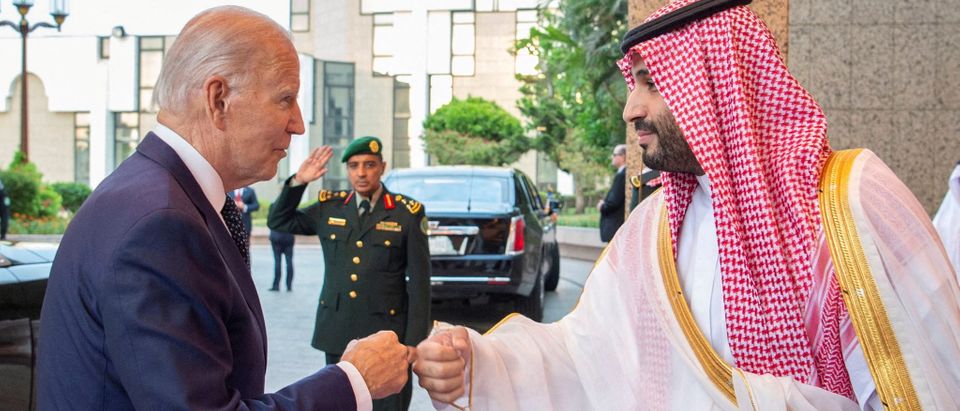Leadership matters at home, but especially abroad. Right now, we are witnessing what happens when American leadership is not just missing, but wholly in doubt by our allies and adversaries alike. At nearly every turn, President Joe Biden’s foreign policy decisions have eroded our credibility on the international stage, undermined our global leadership, and created a volatile geopolitical situation not seen in years—a situation that will get worse and leave us alone and isolated if things don’t change.
In the Middle East, the administration is dead set on re-engaging with Iran to achieve an agreement on Tehran’s nuclear program. It was a bad idea and bad agreement under President Barack Obama, and it’s an even worse idea now. Iran is now providing Russia with kamikaze drones and trainers in its fight against Ukraine. The country’s Islamic Revolutionary Guard Corps (IRGC) is fomenting instability across the Middle East, arming everyone from Hezbollah in Lebanon and Syria to the Houthi rebels in Yemen.
It is actively seeking to undermine Israel’s peace and security. This, all the while it is pursuing the expansion of its nuclear weapons and ballistic missile program. Tehran was not then and is not now a reliable partner. Instead of making concessions to it, we should be isolating it further, supporting the brave women protestors across the country, and actively undermining the regime.
The Biden administration’s active courting of Tehran is alienating our allies in the region. Saudi Arabia is, not surprisingly, questioning our commitment to the Middle East and we’re seeing in real time what that means. The OPEC+ agreement to cut oil production was nothing if not an outright questioning of America’s leadership in the region.
The administration went to Riyadh asking them—ahead of an election, mind you—to delay the production cut decision until after the midterms. The Saudis balked. This shouldn’t have surprised us. The Biden administration has openly questioned the value of the relationship and eroded our position as a guarantor of security in the region. Our disastrous withdrawal from Afghanistan, our inconsistent policy on Yemen, and our willingness to engage Iran is causing Saudi Arabia, not surprisingly, to question our leadership. Why would they work with us if they courting their enemy and castigating them in public?
In the Indo-Pacific, the region to which the administration is half-heartedly pivoting, we see a reckless North Korea firing missiles across Japan—our key ally—with little if any response. That Pyongyang feels comfortable doing this says all you need to know about our standing in the region. A verbal slip of the tongue by the Vice President could be forgiven, but that lack of attention to detail and the lack of response speaks volumes in Seoul and Tokyo.
In Beijing, the latest Communist Party Congress reflects the questioning of American leadership on the global stage. President Xi jinping took a far more aggressive tone in his remarks than in years’ past. As he works to consolidate his position at home, and seeing Washington on the decline, is feeling increasingly emboldened to act on the international stage. This too shouldn’t surprise us. Our lack of seriousness in investing in our Navy and Air Force, our inability to prioritize key relationships in the region, our policies in the Middle East, and the disastrous withdrawal from Afghanistan have only served to reaffirm the views of Xi and the Chinese Communist Party that American leadership is waning.
The CHIPS Act aside, Beijing believes we have few short-term levels with which we can affect Chinese policy, but knows we have medium- to long-term tools that can certainly affect Xi Jinping’s aggressive goals for the region and the world—provided we are willing to act. Right now, Beijing sees Washington leadership as weak and ineffectual; lacking commitment and resolve, and in many cases, simply absent.
That needs to change.
The Biden administration, and the staff it inherited from the Obama years, have spent too long being too timid and too afraid of American leadership. They told us that American leadership is not a solution, but part of the problem. That, somehow, if we took a step back and allowed other countries to drive the global agenda that things would get better. They did not; they got worse—a lot worse, and we’re feeling the consequences of their withdrawal from the world stage.
We need to recapture the spirit of President Ronald Reagan—a spirit driven by a vision of America’s place in the world, informed by our shared values and belief in liberty and freedom. We need to act smartly on the world stage engaging where necessary, working with allies where possible, and no longer being afraid of the positive role America can and indeed should play in the world.


